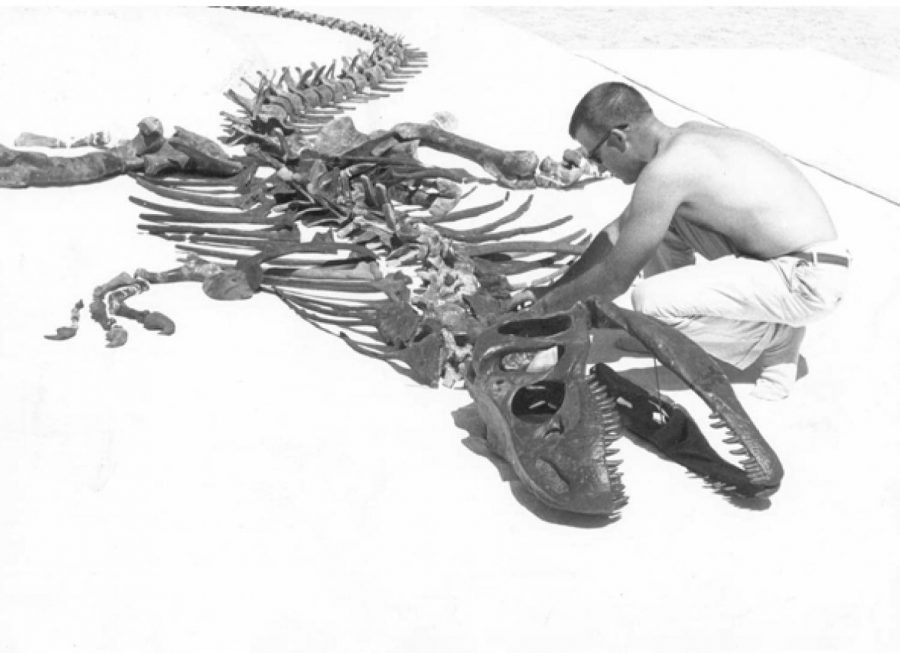Alexander: Protect Fossils From Privatization
Utah’s state paleontologist, James Madsen Jr., assembling the skeleton of an Allosaurus. (Courtesy NHMU)
December 28, 2021
As a kid, I was obsessed with dinosaurs. I still am. My fascination with these creatures started when I watched “Jurassic Park” (1993) for the first time with my grandpa. I thought about paleontology as a career and took a dinosaur class my freshman year. Although I changed my mind about paleontology, my love for dinosaurs hasn’t faltered.
Dinosaurs roamed the Earth so long ago that their remaining skeletons serve as our only means to learn about them. It’s mind-blowing that we get to study these ancient creatures and learn their history through their bones. Experts willingly share this piece of history in museums and public collections for the general public to admire. However, private collectors have absurdly claimed ownership of these skeletons before they’re even dug up from the ground. As a patron of museums and a dinosaur enthusiast, it’s saddening to see dinosaur fossils being auctioned off to wealthy people who keep these tremendous creatures to themselves.
Experts of paleontology have questioned the ethics of the commercialization and selling of dinosaur fossils. As a finite resource and gem, dinosaur fossils have been sold to museums and private collectors alike for immense amounts of money. And the price tags for these specimens have only garnered more controversy.
In 1997, Sue the T-Rex sold for $8.36 million to the Field Museum of Natural History in Chicago, equating to $13.5 million today. In October 2020, Stan the T-Rex sold for a whopping $31.8 million to a private collector. And in October 2021, an anonymous buyer purchased Big John — the largest triceratops skeleton ever found — for $7.7 million. Experts have expressed concern over the rising prices of dinosaur bones, fearing they might lose scientifically valuable fossils to private collectors. If the commercialization of dinosaur fossils persists, researchers and public admirers won’t have access to these historically significant creatures.
Dinosaur fossils have become luxury commodities and investment vehicles for the particularly wealthy. Commercial sellers are more preoccupied with the potential price of a specimen versus its scientific value. Some commercial sellers fail to document where a specimen comes from or what type of rock surrounded it, which helps paleontologists learn more about these creatures. Poachers also destroy parts of skeletons for pieces of higher value, such as teeth or claws, with absolutely no respect for the skeleton itself. As prices of fossils rise, only wealthy collectors and those within the black market can purchase them for their private collections. This could keep important specimens out of reach of scientists and the general public — even newly discovered dinosaurs.
As cool as it would be to have my own dinosaur skeleton or fossil, I understand the importance of keeping these amazing specimens in circulation. Dinosaur bones aren’t replicable, so we should treat them with the respect they deserve.
To stop the privatization and commercialization of dinosaur fossils, we need to stop circulating them in auctions where private collectors can purchase them. Dinosaur fossils, especially ones of scientific value, should only be sold to museums and researchers, if at all. That way, these specimens can stay within scientific communities studying them. Museum curators and collectors can also aid in stopping the privatization of dinosaur fossils. By paying the actual value of a fossil instead of the driven-up price caused by demand, inflation will not influence the value of dinosaur bones. In turn, private collectors will stop spending so much on them.
In addition, regulating and monitoring the sale of dinosaur fossils prevents commercialization and the rise of black market involvement. Commercial selling and poaching activity may decrease if fossil prices fail to reach profitable levels. If commercial selling and poaching activity decrease, dinosaur fossils will remain in expert circulation and out of the hands of private collectors.
If you want to keep seeing dinosaur fossils in our natural history museums as I do, then we need to keep these scientific beauties in the hands of people who want to share them. Treating pieces of history like luxury commodities is a dangerous practice. We should treat dinosaur fossils and skeletons as a shared heritage among us all. If we allow private collectors and the insanely wealthy to claim ownership of these creatures, we allow our own history of the world to slip through our fingers and out of our sight.









Sugar • Jan 23, 2022 at 2:38 am
Jealous perhaps? There are drawers full of fossils unseen by the public. So be it!